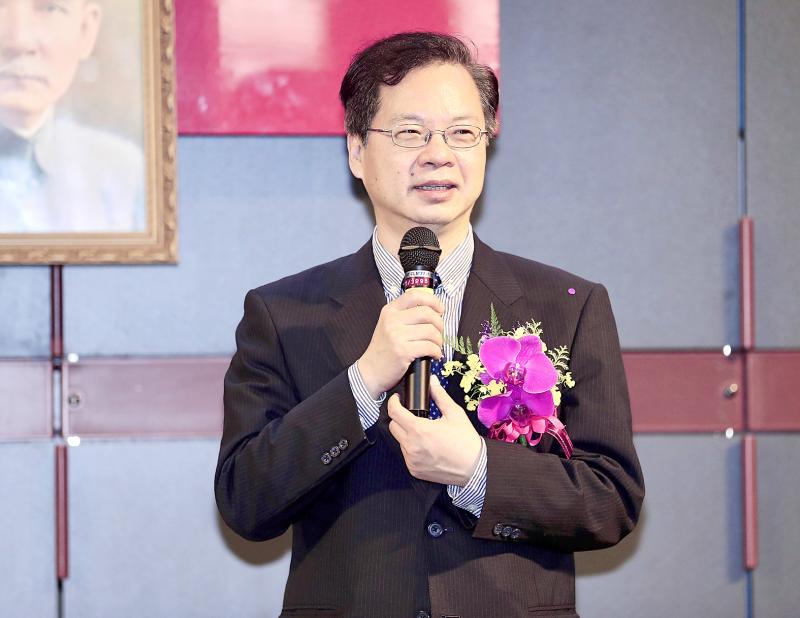The National Development Council (NDC) is to draw up a road map to guide the nation’s search for a new growth engine in the next four years based on technology, green energy and other core strategic industries, new NDC Minister Kung Ming-hsin (龔明鑫) said yesterday.
The world would see continued US-China trade tensions and supply chain realignment characterized by less concern over production costs and more for risk control and the assurance of critical technology and materials, Kung said.
“The shifting trends pose both challenges and opportunities, and Taiwan should carve out a niche position on the global stage,” Kung said.

Photo: CNA
Taiwan’s information technology sector commands global leadership, enabling the nation to emerge unscathed from a US-China trade war and remain resilient amid the ongoing COVID-19 pandemic, he said.
The nation’s economy would grow by more than 1 percent this year, while major trading partners suffer contractions induced by lockdown measures to contain the novel coronavirus, he added.
Local tech firms have benefited from a surge in demand for laptops, tablets and devices used in teleworking and distance learning, which has helped offset a decline in smartphone sales, Kung said.
Technology is to gain more importance in the post-pandemic era, when Taiwan can seize on growing demand for 5G, artificial intelligence and the Internet of Things, he said.
The future technology supply chain would assign more weight to the pursuit of quality instead of quantity, which contributed to the rise of China and ASEAN states as the world’s factories, Kung said.
The council would press ahead with efforts to build Taiwan into the “Asian Silicon Valley,” he said.
In the meantime, the government is to deepen the development of renewable energy sources, particularly offshore wind farms that would grow into another trillion-dollar business and create well-paid jobs for young people, Kung said.
Wind farms last for only two decades, creating a need for new workers for decades to come, he said.
The council would also create a list of critical technologies and materials, and make sure that the government builds up a healthy supply for national security, Kung said, citing face masks and related materials as examples.
The government would assume a more active role in the nation’s economic development, as seen in a so-called national team for the production of masks, stabilization of the local bourse and financial relief efforts amid the pandemic, Kung said, adding that the change is consistent with the global trend toward deglobalization.
The council would wrap up the road map as soon as possible, he said.

TAKING STOCK: A Taiwanese cookware firm in Vietnam urged customers to assess inventory or place orders early so shipments can reach the US while tariffs are paused Taiwanese businesses in Vietnam are exploring alternatives after the White House imposed a 46 percent import duty on Vietnamese goods, following US President Donald Trump’s announcement of “reciprocal” tariffs on the US’ trading partners. Lo Shih-liang (羅世良), chairman of Brico Industry Co (裕茂工業), a Taiwanese company that manufactures cast iron cookware and stove components in Vietnam, said that more than 40 percent of his business was tied to the US market, describing the constant US policy shifts as an emotional roller coaster. “I work during the day and stay up all night watching the news. I’ve been following US news until 3am

UNCERTAINTY: Innolux activated a stringent supply chain management mechanism, as it did during the COVID-19 pandemic, to ensure optimal inventory levels for customers Flat-panel display makers AUO Corp (友達) and Innolux Corp (群創) yesterday said that about 12 to 20 percent of their display business is at risk of potential US tariffs and that they would relocate production or shipment destinations to mitigate the levies’ effects. US tariffs would have a direct impact of US$200 million on AUO’s revenue, company chairman Paul Peng (彭雙浪) told reporters on the sidelines of the Touch Taiwan trade show in Taipei yesterday. That would make up about 12 percent of the company’s overall revenue. To cope with the tariff uncertainty, AUO plans to allocate its production to manufacturing facilities in

Six years ago, LVMH’s billionaire CEO Bernard Arnault and US President Donald Trump cut the blue ribbon on a factory in rural Texas that would make designer handbags for Louis Vuitton, one of the world’s best-known luxury brands. However, since the high-profile opening, the factory has faced a host of problems limiting production, 11 former Louis Vuitton employees said. The site has consistently ranked among the worst-performing for Louis Vuitton globally, “significantly” underperforming other facilities, said three former Louis Vuitton workers and a senior industry source, who cited internal rankings shared with staff. The plant’s problems — which have not

COLLABORATION: Given Taiwan’s key position in global supply chains, the US firm is discussing strategies with local partners and clients to deal with global uncertainties Advanced Micro Devices Inc (AMD) yesterday said it is meeting with local ecosystem partners, including Taiwan Semiconductor Manufacturing Co (TSMC, 台積電), to discuss strategies, including long-term manufacturing, to navigate uncertainties such as US tariffs, as Taiwan occupies an important position in global supply chains. AMD chief executive officer Lisa Su (蘇姿丰) told reporters that Taiwan is an important part of the chip designer’s ecosystem and she is discussing with partners and customers in Taiwan to forge strong collaborations on different areas during this critical period. AMD has just become the first artificial-intelligence (AI) server chip customer of TSMC to utilize its advanced